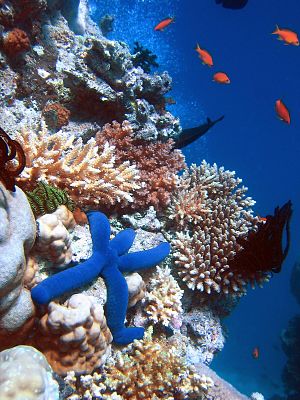 Image via WikipediaWelcome to my video blog post the Great Barrier Reef Corals.
Image via WikipediaWelcome to my video blog post the Great Barrier Reef Corals.If you have been following this blog you may of noticed the concerns based around the reef and climate change!
There just may be a glimmer of hope!
View the article below to find out more today!
Coral bleaching on the Great Barrier Reef
Coral bleaching occurs when corals get too hot. Bleached corals are essentially sick corals and although they can recover, if temperatures are too warm for too long, the corals will die. Coral bleaching and in some cases death, is an impact of climat...
,
Great barrier relief: corals are tougher than expected
by: Sarah Elks, North Queensland correspondentFrom: The Australian
November 14, 2011
RESEARCHERS are discovering pockets of tough survivor corals around Australia, sparking hope reefs are more resilient to the devastating effects of climate change than feared.
On the southern Great Barrier Reef, quick-growing coral has survived bleaching caused by a spike in sea temperatures; off the Kimberley coastline, researchers are marvelling at the ability of the reef to adapt to warming waters; while a new Australian study reveals some coral can offset ocean acidification when surrounded by seagrass beds.
But despite the glimmers of hope, scientists say reefs are not adapting quickly enough to cope with the rate of climate change, and the forecast is still bleak.
 Image by Michael McDonough via Flickr
Image by Michael McDonough via Flickr Image via Wikipedia
Image via Wikipedia Image via Wikipedia
Image via WikipediaUniversity of Western Sydney biologist Anya Salih studies the reefs off Lord Howe Island and has discovered corals with high levels of fluorescent protein are less vulnerable to coral bleaching.
Free trial
"This does show corals have some capacity to resist climate change," Dr Salih said, while noting that even those with the protein suffered.
"However . . . the predicted increases of temperature indicate they are likely to reach levels beyond the adaptive capacity of the more resilient corals."
Dr Salih said scientists were regularly observing the resilience of corals to extreme conditions.
"The question is not whether there are corals that are more resilient than others - there certainly are - but whether the speed of adaptation is fast enough to keep up with the rate of climate change," she said.
"Much of the evidence is showing it cannot."
Mass bleaching is caused when normal summer sea temperatures rise by more than one or two degrees for a sustained period, combined with direct sunlight.
Australian Museum coral biodiversity researcher Zoe Richards has observed first-hand how rapidly corals on remote Ashmore Reef, off Western Australia, recovered from significant bleachings in 1998 and 2003.
There, the percentage of hard coral on the seabed increased in four years from 10 per cent in 2005 to nearly 30 per cent in 2009, while the percentage cover of soft corals doubled over the same period.
"It was a rapid recovery and quite unexpected, given the reef's isolation," Dr Richards said.
But the ability of reefs to adapt and survive the effects of climate change was hindered by other man-made threats, such as overfishing and chemical runoff, Dr Richards said.
Snorkelling at Long Bommie on the Great Barrier Reef off Cairns, student Claudia Pudelko, 23, said it was imperative the reef was protected.
"It's very important, especially for Cairns, because the whole economy here is based on it," said Ms Pudelko, who moved from Germany to Australia in 2007 to work on a reef dive boat.
"Ninety per cent of my friends work in the tourism industry here, and they would be without a job."
view original article here!
As you can see from the article above there is a glimmer of hope!
I am sure that there are many worried companies that survive alone on the almighty tourist dollar.
But, truthfully it's more than just the money, it is also the future of the reef, the underwater eco systems and much much more!
I hope you enjoyed this article the Great Barrier Reef Corals?
Please share it online at your favorite website, such as Twitter and Facebook!
Happy Holidays
Marty

No comments:
Post a Comment